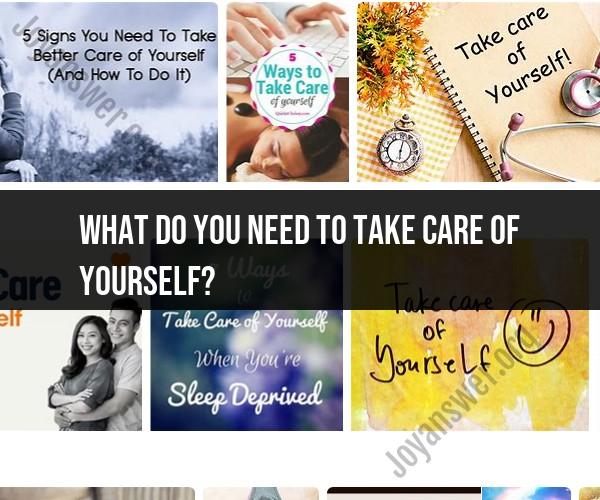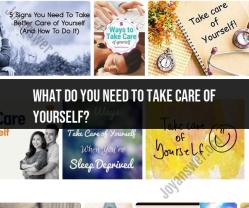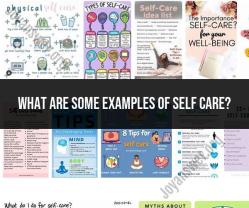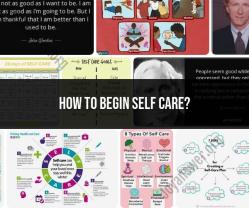What do you need to take care of yourself?
Taking care of yourself involves addressing various aspects of your well-being, including physical, emotional, mental, and social needs. Here are some self-care essentials that you need to prioritize your overall well-being:
1. Time for Yourself:
- Allocate time in your schedule for self-care activities.
- Create boundaries to protect your personal time and well-being.
2. Sleep:
- Aim for adequate and restful sleep each night.
- Establish a consistent sleep routine.
3. Healthy Nutrition:
- Maintain a balanced diet with nutritious foods.
- Stay hydrated by drinking enough water.
4. Physical Activity:
- Incorporate regular exercise into your routine.
- Choose activities that you enjoy to make fitness sustainable.
5. Stress Management:
- Practice stress-reduction techniques, such as deep breathing, meditation, or mindfulness.
- Identify and address sources of stress in your life.
6. Emotional Expression:
- Express your feelings and emotions in healthy ways, whether through journaling, art, or conversations with trusted friends or a therapist.
7. Social Connections:
- Foster and nurture positive relationships with family and friends.
- Seek social support when needed.
8. Boundaries:
- Set and communicate clear boundaries in your personal and professional life.
- Learn to say no to commitments or situations that don't align with your well-being.
9. Self-Compassion:
- Be kind and compassionate toward yourself, especially during challenging times.
- Avoid self-criticism and practice self-acceptance.
10. Hobbies and Interests:- Engage in hobbies and activities that bring you joy and fulfillment.- Explore new interests and passions.
11. Mental Stimulation:- Challenge your mind with activities that stimulate cognitive function.- Read, learn, and engage in mental exercises or puzzles.
12. Professional Growth:- Invest in your career development and job satisfaction.- Pursue opportunities for skill enhancement and growth.
13. Relaxation:- Create moments of relaxation in your day, whether through breaks, baths, or moments of quiet reflection.- Prioritize rest and leisure activities.
14. Self-Care Plan:- Develop a personalized self-care plan or routine that aligns with your needs and values.- Adjust your plan as circumstances change.
15. Professional Help:- Seek professional assistance when dealing with mental health challenges or life difficulties.- Reach out to therapists, counselors, or medical professionals as needed.
16. Gratitude and Positivity:- Cultivate a sense of gratitude and focus on positive aspects of your life.- Practice optimism and positive thinking.
17. Self-Care Tools and Resources:- Identify and gather resources that support your self-care, such as books, apps, or self-help materials.- Utilize available tools to enhance your well-being.
18. Self-Reflection:- Periodically reflect on your self-care practices and assess their effectiveness.- Make adjustments to your self-care routine as needed.
Remember that self-care is a dynamic and evolving process. What you need to take care of yourself may change over time, and it's essential to adapt your self-care practices to align with your current circumstances and priorities. Prioritizing self-care is an investment in your long-term physical, emotional, and mental well-being.
Essentials for Proper Self-Care and Meeting Your Needs
Proper self-care is essential for meeting your physical, emotional, and mental needs. It is about taking care of yourself in a way that allows you to flourish and thrive.
Here are some essentials for proper self-care:
- Identify your needs. What are the things that make you feel good and help you to function at your best? Once you know what your needs are, you can start to develop a self-care routine that meets those needs.
- Be proactive. Don't wait until you are feeling overwhelmed or burned out to start taking care of yourself. Make self-care a regular part of your life, even when things are going well.
- Make time for yourself. It is important to schedule time for self-care in your day. This will help you to make sure that you actually make time for yourself.
- Be flexible. Your self-care routine should be flexible enough to meet your changing needs. Some days you may have more time for self-care, while other days you may have less time. That's okay. Just try to do what you can each day.
- Be kind to yourself. Self-care is about being kind to yourself and taking care of your needs. It is not about being perfect or doing everything right. Just focus on doing what makes you feel good and what helps you to take care of yourself.
Lifestyle Factors and Routines for Optimal Self-Care
Certain lifestyle factors and routines can help you to achieve optimal self-care. These include:
- Getting enough sleep. Most adults need around 7-8 hours of sleep per night.
- Eating a healthy diet. Eat plenty of fruits, vegetables, and whole grains. Limit processed foods, sugary drinks, and unhealthy fats.
- Exercising regularly. Aim for at least 30 minutes of moderate-intensity exercise most days of the week.
- Managing stress. Find healthy ways to manage stress, such as exercise, yoga, meditation, or spending time in nature.
- Connect with others. Spend time with loved ones, join a club or group, or volunteer in your community.
Self-Care Fundamentals - Health, Hygiene, Diet, Exercise, Sleep
The self-care fundamentals of health, hygiene, diet, exercise, and sleep are essential for optimal well-being.
- Health: This includes getting regular checkups and screenings from your doctor, taking any prescribed medications according to instructions, and managing any chronic health conditions.
- Hygiene: This includes bathing or showering regularly, brushing your teeth twice a day, and wearing clean clothes.
- Diet: This includes eating a balanced diet that contains all the nutrients your body needs. It is important to limit processed foods, sugary drinks, and unhealthy fats.
- Exercise: This is essential for maintaining a healthy weight, reducing stress, and improving your overall mood and well-being. Aim for at least 30 minutes of moderate-intensity exercise most days of the week.
- Sleep: Most adults need around 7-8 hours of sleep per night. Getting enough sleep is essential for physical and mental health.
By taking care of your physical, emotional, and mental needs, you can achieve optimal self-care and live a happy and fulfilling life.







